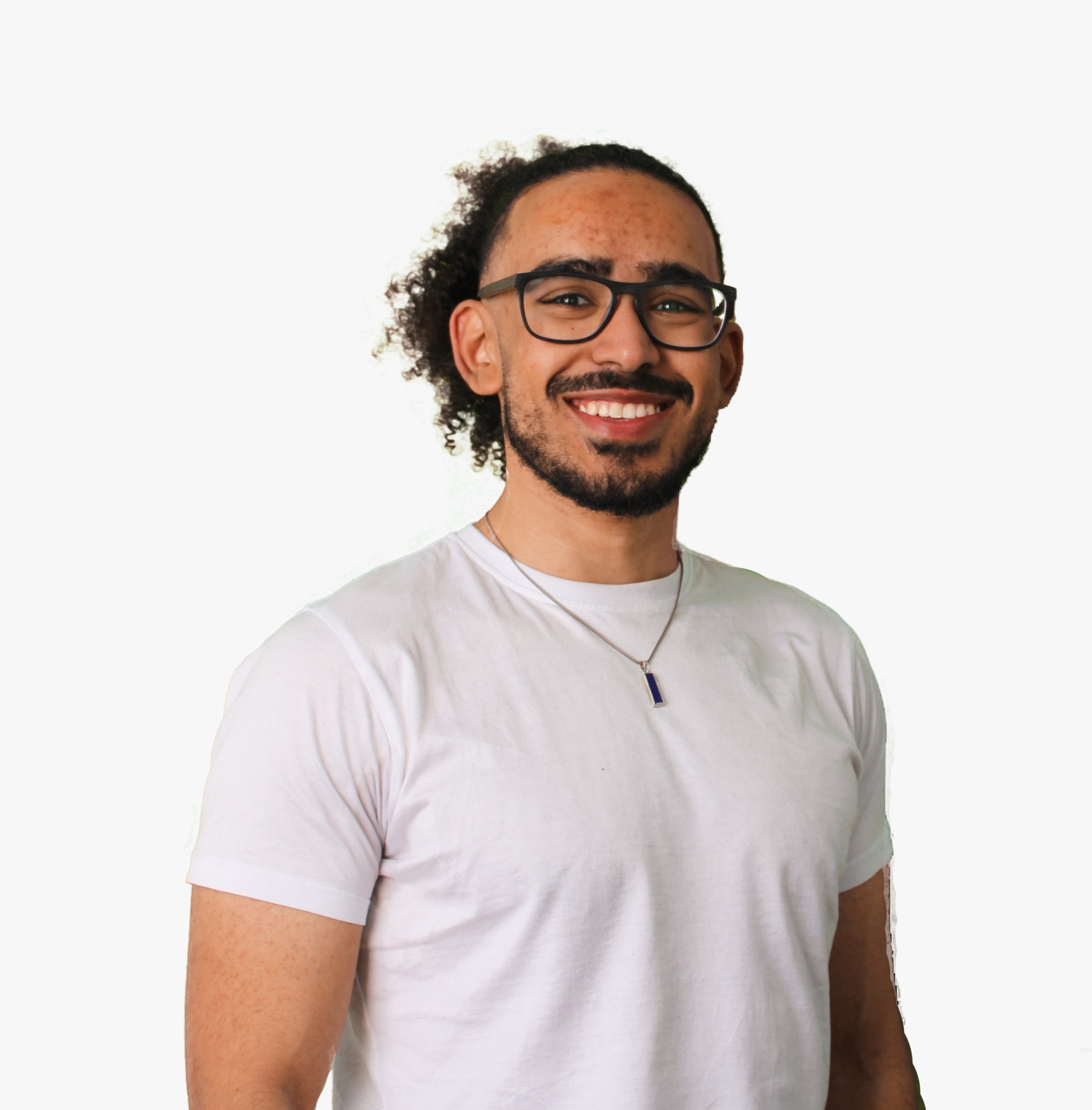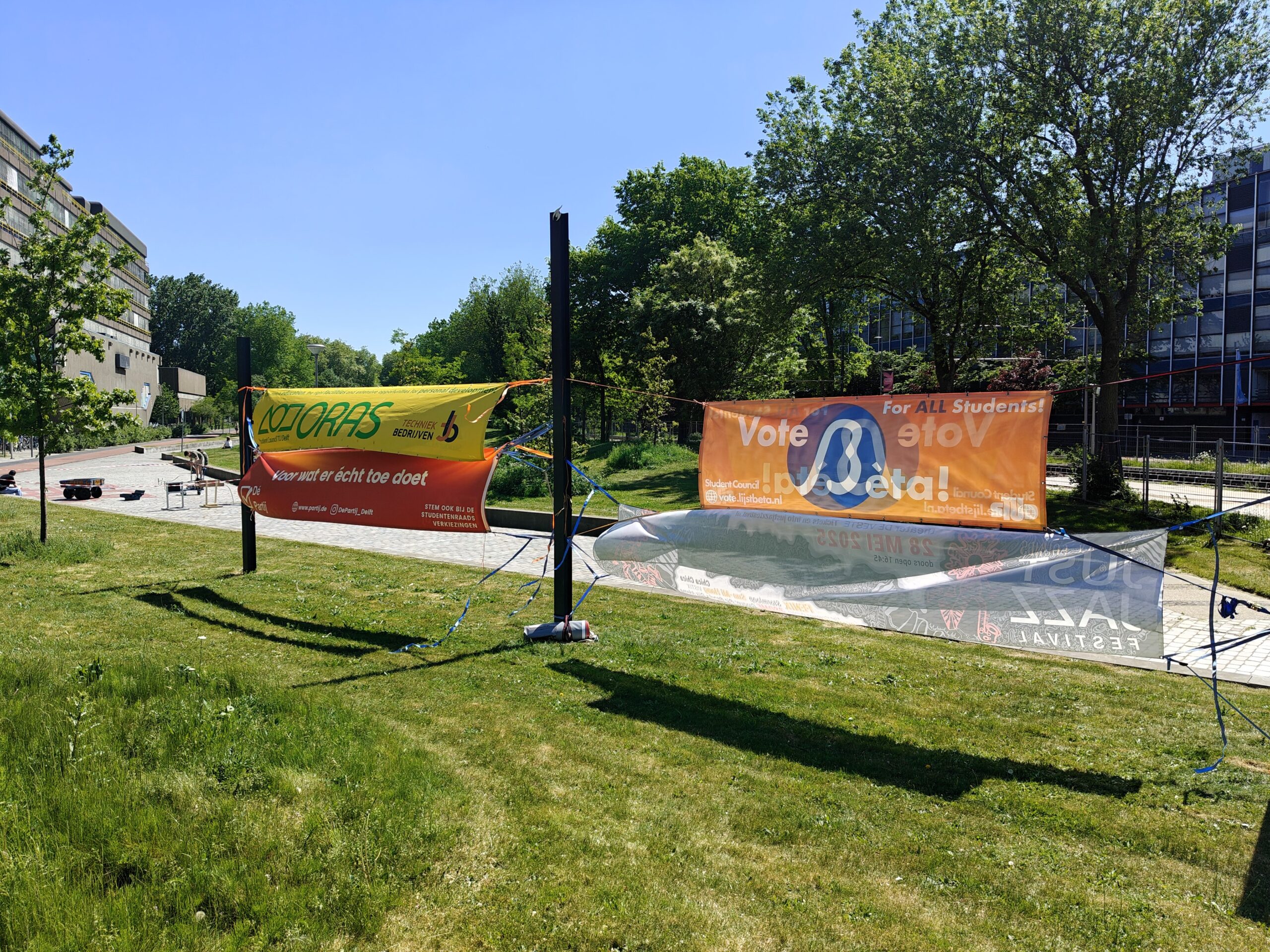Language use divides the Student Council: Dutch for effectiveness, English for inclusion. An open letter from former Council member Albaraa Khalil has reignited the debate. During his year on the Council, he felt excluded as the only non-Dutch speaking student. The other parties on the Council have expressed shock, but also point to existing agreements and practical limitations.
Banners of Oras, Dé Partij and Lijst Bèta in the Mekelpark. (Photo: Marjolein van der Veldt)
At other universities too, language use in participatory governance is causing friction. In 2024, the Ministry of Education ruled that bilingual meetings are not legally tenable, after which Erasmus University switched entirely to Dutch.
At TU Delft, meetings between the Executive Board and the Works Council are conducted in Dutch by default. Interpreters are present to support Works Council members who do not speak Dutch. In the Student Council (SC), the language policy is determined by the Council itself, which makes annual agreements on the issue in what is known as a covenant. Still, not every member feels adequately protected by this. One such member is Master’s student Albaraa Khalil, who served on the Council in 2023-2024 on behalf of Lijst Bèta.
Outsider
‘I was constantly overlooked, an afterthought in spaces where I was supposed to belong’, he wrote at the end of April in a letter about his year as a member of the SC for Lijst Bèta. The letter is addressed to Delta and the entire Council.
- Read the letter
As the only non-Dutch speaking student on the Council during the 2023-2024 academic year, he often felt like he didn’t truly belong. For example, during public Council meetings he often felt lost. ‘Entire discussions, sometimes lasting 30 to 45 minutes, were held in Dutch. I could not follow or take part, and the summaries were never enough for me to voice an informed opinion.’
According to him, Dutch was often the norm in emails, informal conversations, and documents as well. ‘For an entire year, I continuously reminded Council members from other parties and staff to communicate with me in English.’ Eventually, he stopped speaking up. ‘But just because I stopped saying something, didn’t mean I agreed. I just didn’t have the energy to keep fighting’, he explains.

Clear agreements on language use
Oras and Dé Partij, the other parties on the Council, both responded in writing to the letter. They expressed shock at Albaraa’s experiences. They want to emphasise that new agreements on the language of communication are made every year.
During Albaraa’s Council year of 2023-2024, a compromise had been agreed upon: meetings were mostly conducted in English, and difficult Dutch documents were in Dutch. ‘Only on points where Albaraa would not be the first speaker, would the issue be discussed in Dutch. Points he raised were always handled in English’ Oras explained in a written response.
Complex dossiers
Oras, the largest party this academic year with six seats, argues that Dutch is more effective for discussing complex dossiers with the Executive Board. Oras writes ‘In the presence of international students, we meet as much as possible in English. But in a council that speaks entirely in Dutch and facing experienced administrators, we can represent TU Delft students most effectively by debating in Dutch technical jargon, while we would simply struggle and lose out more quickly in English.’ The party also points out the previously mentioned national developments.
‘We don’t feel comfortable speaking English” or “Legal language is difficult to translate’
Albaraa believes that his year’s covenant was inadequate. While English was the official working language, certain agenda items were still discussed in Dutch. Attempts by Lijst Bèta to change this failed. ‘People saying “We don’t feel comfortable speaking English” or “Legal language is difficult to translate” were used to justify the status quo.’
Dé Partij emphasises that ‘the covenant consists of agreements between the party leaders, with everyone free to choose whether or not to adhere to the provisions’, the party said in a written response. The goal is to work together more effectively. Lijst Bèta itself signed the covenant, including the agreements on language use.
Open door
Council member Koos Meesters (Dé Partij) says he regrets that Albaraa did not approach him directly. “I always try to be open for dialogue. To symbolise this I always keep my office door open. That I didn’t manage this time is something that I take to heart and hold myself accountable for.”
‘The lack of acknowledgement and action was painful’
In his letter, Albaraa states that he did, in fact, share his experiences. ‘After our first consultation meeting, I shared my feelings of exclusion with the other parties, hoping for empathy and change. The response? A cold reaction of thanks for sharing, followed by moving on to the next point. The lack of acknowledgement and action was painful.’
Both Oras and Dé Partij deny the claim that meetings mainly took place in Dutch. According to them, the minutes show that the SC’s meetings with the Executive Board were largely conducted in English. Only when a Council member was not proficient in English, did they switch to Dutch. Meetings with the Works Council were conducted in Dutch, as required by the Executive Board.
Deep-rooted culture
Lijst Bèta confirms Albaraa’s account and says that other international Council members had also experienced exclusion in recent years. ‘There is a deeply rooted culture in which Dutch is the default,’ the party states. ‘We speak English in meetings when international attendees are present, but this often meets resistance.’
The party says it works hard to make the Council more accessible, with multilingual communication, Diversity & Inclusion meetings, and a policy that allows students from outside the EU to pay EU tuition fees during their Council term instead of the much higher institutional rate. ‘This makes it financially feasible for international students to run at all.’
Language use in the Student Council
- The parties make annual agreements on the language of communication in a covenant.
- In 2023-2024, the covenant stated that meetings would largely be conducted in English. Complex, policy-related agenda items would, in exceptional cases, be discussed in Dutch.
- In 2024-2025, the language of communication is Dutch as all members speak the language. If a Council member wishes to discuss an agenda item in English, this is possible. In the presence of non-Dutch speaking guests or audience members, a summary will always be provided in English.
- If a non-Dutch speaking Council member is elected in the future, the language policy will be reconsidered.
Timing of the letter
The timing of Albaraa’s letter – just before Student Council elections – raises questions. Oras notes that he is sixth on Lijst Bèta’s candidate list. ‘It feels like campaigning,’ the party claims. ‘An honest conversation during his term would have been more constructive.’ Lijst Bèta sees it differently. ‘The fact that he’s speaking out now deserves respect. It’s not easy to publicly criticise a body you were once part of.’
‘An honest conversation during his term would have been more constructive’
For Albaraa, the timing isn’t a stunt but a response to the current election campaign. ‘Now that a new campaign cycle has begun, I’ve read the promotional materials of other parties that include statements claiming they care about international students. It makes me feel disheartened. How can a party claim to support international students while refusing to even speak the language most of them understand?’
Oras’ efforts for international students
A few years ago, Oras established InterDelft, the umbrella association for international student organisations. This body gives 26 international associations a voice vis-à-vis TU Delft and the municipality. In discussions about financial support for students (now the Student Support Fund, formerly the Profiling Fund), the party advocates for all – including international – student leaders.
‘During my term, I stayed quiet in an effort to maintain good relationships with fellow Council members – at the expense of my own well-being. But now I feel a responsibility, and finally have the courage to speak up.”
Do you have a question or comment about this article?
m.vanderveldt@tudelft.nl


Comments are closed.